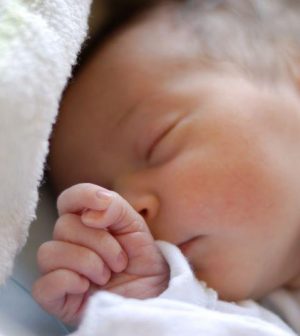- Could Your Grocery Store Meat Be Causing Recurring UTIs?
- Are You Making This Expensive Thermostat Error This Winter?
- Recognizing the Signs of Hypothyroidism
- 10 Strategies to Overcome Insomnia
- Could Artificial Sweeteners Be Aging the Brain Faster?
- Techniques for Soothing Your Nervous System
- Does the Water in Your House Smell Funny? Here’s Why
- Can a Daily Dose of Apple Cider Vinegar Actually Aid Weight Loss?
- 6 Health Beverages That Can Actually Spike Your Blood Sugar
- Treatment Options for Social Anxiety Disorder
Most Young Breast Cancer Survivors Can Have Children

Most young breast cancer survivors can go on to have children despite the effects of their lifesaving treatment, a new study shows.
About 73% of breast cancer survivors attempting to conceive achieved a pregnancy and 65% had a live birth, researchers report.
Those who opted for egg/embryo freezing prior to cancer treatment tended to have a higher live birth rate, researchers found.
“For many young women with breast cancer, the ability to have children following treatment is a major concern,” said lead researcher Dr. Kimia Sorouri, a research fellow with the Dana-Farber Cancer Institute in Boston. “The findings of our study can be helpful when counseling patients about fertility issues.”
“The finding that egg/embryo freezing before treatment was associated with a higher live birth rate underscores the need for accessibility to fertility preservation services for this population,” Sorouri added in a Dana-Farber news release.
For the study, researchers tracked nearly 200 young women for an average 11 years following their successful treatment for breast cancer. All of the women wanted to conceive.
Previous studies have neglected some types of breast cancer patients, followed patients for too short a time or didn’t ask patients if they’d attempted pregnancy, researchers noted.
“This study was designed to address those gaps by tracking pregnancy and live birth rates among a group of breast cancer survivors and patients who indicated they’d attempted to conceive following their cancer diagnosis,” said senior researcher Dr. Ann Partridge, director of the Program for Young Adults with Breast Cancer at Dana-Farber.
The stage of a woman’s breast cancer at diagnosis had no relation to her later ability to achieve pregnancy or have a live birth, results showed.
The findings will be presented at the upcoming annual meeting of the American Society for Clinical Oncology in June. Findings presented at medical meetings should be considered preliminary until published in a peer-reviewed journal.
More information
The American Cancer Society has more about pregnancy after breast cancer.
SOURCE: Dana-Farber Cancer Institute, news release, May 23, 2024
Source: HealthDay
Copyright © 2026 HealthDay. All rights reserved.










